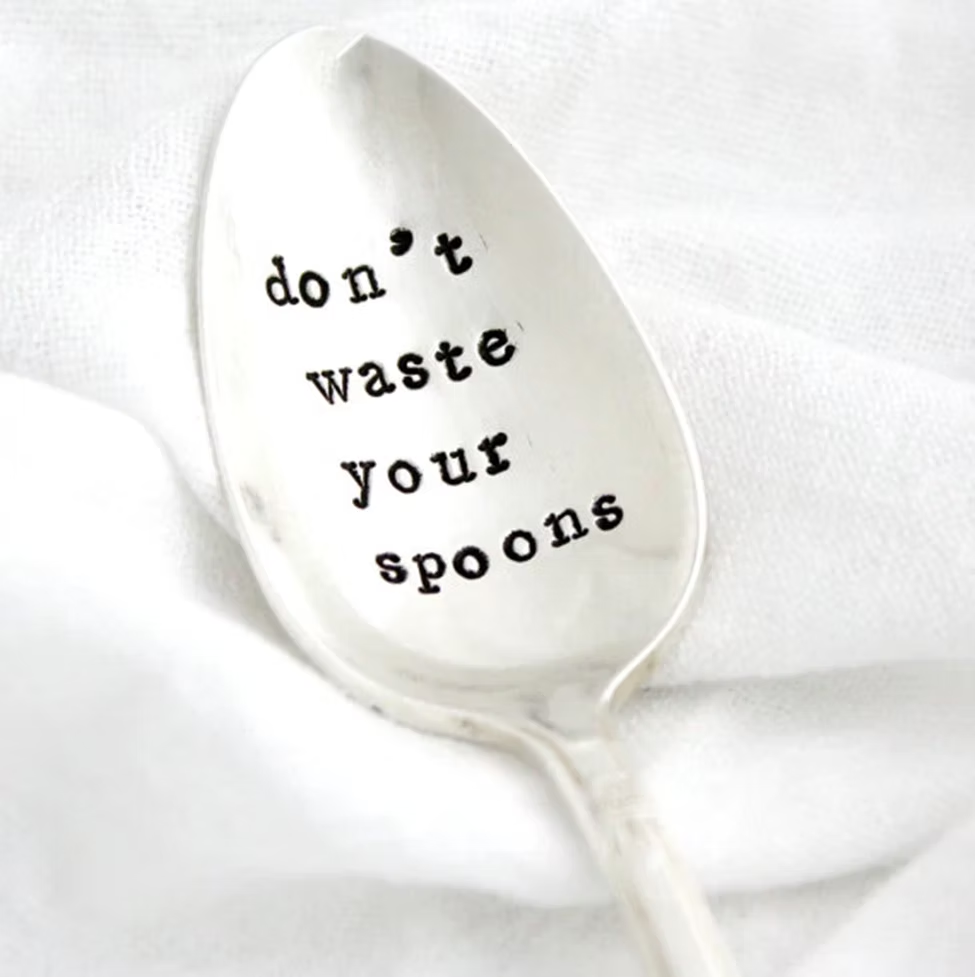MORE FROM THE STACKS
EDITOR’S NOTE: There are literally thousands of journals published around the world that relate to the disability community. It is virtually impossible to capture even a fraction of them. HELEN receives "stacks" of journals and selectively earmarks what we feel are "must read" articles of interest for our readers. It's a HELEN perk.
Stress and Disability
By Cynthia Atkinson and Benjamin Waida (Equal Access: Spring 2024 Series, Kent State University)
Everyone deals with stress in their own way, and people with disabilities encounter unique challenges. Due to the varied way stress affects people, the concept of “spoon theory” is often used to shed light on these differences. Spoon theory suggests that people with disabilities have a limited amount of energy (represented by spoons). Since people with disabilities tend to have higher levels of stress caused by the disability itself or the extra challenges faced every day, the way their “spoons” are distributed is different than someone without a disability.
Stress is an inevitable aspect of life that Individuals with disabilities must confront and manage daily. For some it may persist as a nagging thought in the back of their minds, and for others, it may be the dominant force that takes over their life. Despite limited research on the intersection of disabilities and stress, chronic stress can lead to long-term disabilities and mental health complications.
Stress can be categorized into two main groups: stress related to the individual and stress caused by environmental factors. Each of these groups will take up more of an individual’s spoons. For people with disabilities, individual stress looks different if the disability was a result of an accident, illness, or a congenital impairment.
For example, a person whose disability was a result of an accident or illness that happened later in life can feel stress while trying to adjust to new challenges. Individuals born with a congenital disability may minimize the connection between stress and their disability as their disability is a significant aspect of their identity. Since these instances are more inherent, it may not seem like it would take up an individual’s “spoons,” however, it can limit the amount they start off with.
On the other hand, stress can also be influenced by environmental factors like physical space and others’ bias. For people with disabilities, the inability to travel, difficulties experienced while traveling to desired destinations, or uncertainty about the accessibility of buildings they need to visit can lead to frustration and stress. Transportation itself can already take up an individual’s spoons, and the additional stress related to issues with transportation and architecture will take even more.
People with disabilities often face employment-related stress due to factors such as unemployment and/or inadequate accommodation in the workplace. Unfortunately, they frequently encounter obstacles when applying for jobs as employers may underestimate their capabilities or be unwilling to provide necessary accommodations. All this eats into their original pool of spoons.
While we all experience stress at some time in our lives, it is important to acknowledge that people with disabilities are likely to experience different stressors. Spoon theory can help conceptualize the limited amount of energy an individual with a disability has, and how additional stress can adversely affect what they are capable of every day.
Apply Today for the ANCOR Foundation Leadership Academy
NOW ACCEPTING APPLICATIONS
Leadership Academy Class of 2028
Are you ready to take the next step in your career and make a lasting impact in the field of I/DD services (or do you know someone who is)? We invite you to apply for the next cohort of the ANCOR Foundation Leadership Academy!
The ANCOR Foundation Leadership Academy is designed to empower emerging leaders and mid-career professionals to take their careers to new heights. Over the course of two years, Leadership Academy participants receive hands-on training, ongoing mentorship, and leadership development opportunities to prepare them to lead dynamic disability services organizations.
Whether you’re looking to develop your leadership skills or expand your influence, this program is your opportunity to step up and lead the future of I/DD services.
The ANCOR Foundation Leadership Academy is launching its seventh cohort in March 2026, ready to cultivate the next generation of I/DD leaders.
Participation in the Leadership Academy:
Connects you with nationally recognized experts
Builds a powerful network of colleagues
Offers mentorship from top industry leaders
Helps you develop a standout work product
By the end of the two-year program, you'll have expanded your access to influential circles and boosted your national brand recognition.
Visit the ANCOR Foundation's website today to explore the full program benefits, check your eligibility, and start your application.
Applications for the 2028 cohort are due Friday, December 5, 2025, by 11:59 pm PST.
If you’re ready to shape the future—or if you know someone who is—apply today and take the next step in your leadership journey!
Bernard Lown Award for Social Responsibility
Dr. Bernard Lown
To honor Dr. Lown’s memory, and because our society needs more leaders like him, we created the Bernard Lown Award for Social Responsibility. The BLASR is given each year to a young clinician who demonstrates bold leadership in social justice, health care reform, environmental justice, global peace, or other humanitarian efforts, and comes with a $25,000 prize.
Dr. Bernard Lown, founder of the Lown Institute, was one of the most accomplished physicians and activists of the 20th century. Not only did he create medical innovations that saved countless lives, he repeatedly risked his career to stand up against racial injustice, nuclear war, and the industrialization of healthcare.
Today’s clinicians face challenges that seem similarly insurmountable, such as global health crises, climate emergencies, systemic racism, and growing inequality. Addressing these issues will take a new generation of clinician leaders, who aren’t afraid to go outside the healthcare system to tackle critical health problems. We need more clinicians who have the vision to see the healthcare system as it is, the courage to take a stand, and the confidence to lead the movement for radically better healthcare.
With this award we recognize and lift up these extraordinary clinicians, who are dedicating their time, skills, and energy to tackle the most important health issues of our time, in a world that desperately needs healing.
Nominations are open for the 2026 Bernard Lown Award!
We’re looking for trailblazing young clinicians who are leading the movement for a just and caring healthcare system. Candidates must:
be aged 45 or younger
be a clinician in the United States
stand out for their bold leadership in social justice, health care reform, environmental justice, global peace, or other humanitarian efforts
Special consideration will be given to nominees who have taken on personal and/or professional risk to stand up against injustice. Nominations will be accepted through January 31, 2025.
Every Caregiving Story Begins with Compassion
(Family Caregivers Alliance)
When National Family Caregivers Month was celebrated in November, Family Caregiver Alliance (FCA) honored the more than 63 million Americans who dedicate their time, energy, and care to supporting family members, friends, and neighbors.
This year’s theme was Meeting Caregivers Where They Are, which highlighted what has always been at the heart of FCA’s mission: meeting caregivers in every sense of the phrase. Whether that means reaching them where they are in the world—at home, at work, or online—or where they are on their journey—just beginning, finding balance, or years into care—FCA listens, learns, and provides support that fits each person’s unique experience.
Because caregiving doesn’t happen in one place or one way. It happens in daily moments of resilience, in long nights, and in quiet acts of love and responsibility. FCA continues to meet caregivers wherever they are, emotionally, culturally, and geographically, through programs, partnerships, and advocacy efforts designed to make support accessible and inclusive.
Whether you are a caregiver yourself or a provider, partner, or advocate who supports caregivers, we celebrate you. This month, and every month, FCA stands beside caregivers and the professionals and organizations that support them, celebrating their dedication and helping expand access to the resources that make care possible.
Visit our National Family Caregivers Month page to discover stories, programs, and advocacy efforts created to meet caregivers where they are.
Abiut Family Caregiver Alliance
FCA’s mission is to improve the quality of life for family caregivers and those who receive their care. Our work intersects three key areas: caregiver services, policy, and research. Learn more here. Although a nationally-recognized organization, San Francisco-established FCA has deep roots and community partnerships in the Bay Area.
FCA supports and assists caregivers of adults with chronic or disabling health conditions regardless of race, ancestry, national origin, creed, gender, gender identity, religion, sexual orientation, disability, income, or age.
Are You Passionate About Healthcare for Adults with IDD?
Vanderbilt Kennedy Center
The Vanderbilt Kennedy Center is conducting a project called Boosting the Use of the IDD Toolkit to Enhance Health Outcomes for Adults with IDD focused on understanding the barriers to using the IDD Toolkit and finding strategies to increase its use by primary care providers. The IDD Toolkit is a website that provides information for the primary care of adults with intellectual and developmental disabilities. The Toolkit offers health care providers best-practice tools and information regarding specific medical and mental and behavioral health concerns, including resources for patients and families.
Specifically, we are interested in learning what primary care providers think of the IDD Toolkit tools and resources and understanding strategies that could increase the use of the tools in caring for patients with IDD.
Would you be willing to meet with us virtually to discuss the IDD Toolkit tools and resources? Your participation is completely voluntary. If you choose to participate in this study, you will complete a brief survey and attend a 60-minute focus group. You will receive a $50 Amazon gift card upon completion of the survey and focus group.
For more information and to participate, please click here. Questions? Please contact Verity Rodrigues or Janet Shouse at iddtoolkit@vumc.org.







